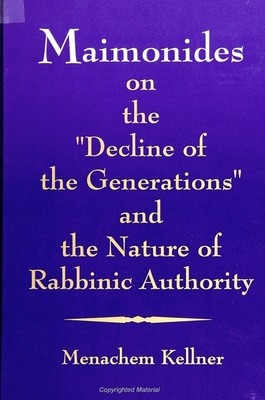
- We will send in 10–14 business days.
- Author: Menachem Kellner
- Publisher: State University of New York Press
- ISBN-10: 0791429229
- ISBN-13: 9780791429228
- Format: 15.1 x 22.8 x 0.9 cm, minkšti viršeliai
- Language: English
- SAVE -10% with code: EXTRA
Maimonides on the Decline of the Generations and the Nature of Rabbinic Authority (e-book) (used book) | bookbook.eu
Reviews
Description
Moses Maimonides, medieval Judaism's leading legist and philosopher, and a figure of central importance for contemporary Jewish self-understanding, held a view of Judaism which maintained the authority of the Talmudic rabbis in matters of Jewish law while allowing for free and open inquiry in matters of science and philosophy. Maimonides affirmed, not the superiority of the moderns (the scholars of his and subsequent generations) over the ancients (the Tannaim and Amoraim, the Rabbis of the Mishnah and Talmud) but the inherent equality of the two. The equality presented here is not equality of halakhic authority, but equality of ability, of essential human characteristics.
In order to substantiate these claims, Kellner explores the related idea that Maimonides does not adopt the notion of the decline of the generations, according to which each succeeding generation, or each succeeding epoch, is in some significant and religiously relevant sense inferior to preceding generations or epochs.
EXTRA 10 % discount with code: EXTRA
The promotion ends in 22d.07:42:43
The discount code is valid when purchasing from 10 €. Discounts do not stack.
- Author: Menachem Kellner
- Publisher: State University of New York Press
- ISBN-10: 0791429229
- ISBN-13: 9780791429228
- Format: 15.1 x 22.8 x 0.9 cm, minkšti viršeliai
- Language: English English
Moses Maimonides, medieval Judaism's leading legist and philosopher, and a figure of central importance for contemporary Jewish self-understanding, held a view of Judaism which maintained the authority of the Talmudic rabbis in matters of Jewish law while allowing for free and open inquiry in matters of science and philosophy. Maimonides affirmed, not the superiority of the moderns (the scholars of his and subsequent generations) over the ancients (the Tannaim and Amoraim, the Rabbis of the Mishnah and Talmud) but the inherent equality of the two. The equality presented here is not equality of halakhic authority, but equality of ability, of essential human characteristics.
In order to substantiate these claims, Kellner explores the related idea that Maimonides does not adopt the notion of the decline of the generations, according to which each succeeding generation, or each succeeding epoch, is in some significant and religiously relevant sense inferior to preceding generations or epochs.


Reviews